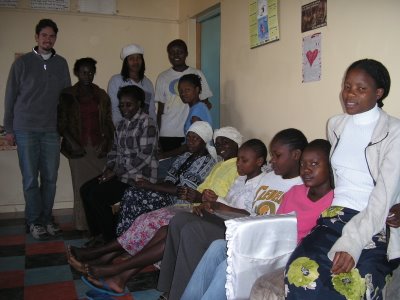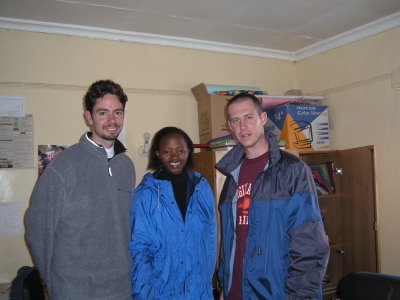Saturday, August 05, 2006
Nairobi: Encountering Jesus Outside the City

I’ll never forget the day Wes and I met Jesus in the slum area of Korogocho on the outskirts of
Shortly after arriving, we were asked to share an encouraging lesson from Scripture with the girls. The program director, Mary, handed us a Bible and said we could have a few minutes to prepare. “You’ll have about an hour to speak to them,” she said. What had we gotten ourselves into? We thought we were just there for a visit! And who were we, two American men, to share a message of hope with these Kenyan girls from the poorest of the poor?
I led the small group in a discussion of the gospel story about the paralytic whose faith-filled friends lowered him through a roof to get him to Jesus. The interactive discussion was different from the sit-silently-and-listen-to-the-teacher Bible studies common to their culture, and I was glad they tried their best to respond to my questions. Still, I could see the lack of self-esteem in some of their faces. How often do these girls get to interact with young men who treat them with respect and believe they have something to say?

After the Bible study Mary and some of the girls led us into the heart of the slum to a clinic and church, both also named Tumaini. The pastor’s office in the clinic, shared by George and James, was like a closet, with a mostly empty bookshelf, a small desk, a bench, and a wooden chair frame without a seat. These men live in the slum, receive no financial support from their church, and yet they welcomed us by offering to go get us soft drinks. George probably spent the local equivalent of a day’s wages to offer us the refreshment of an orange Fanta – unbelievable hospitality. The church itself, planted last year, was as equally unimpressive as the office, with uneven dirt floors, tin roofing, and a few low, backless benches. Yet in that small space, the Lord brings 75 people (mostly children) to worship each Sunday.
At the end of the day we caught a ride back downtown in a Matatu, a hip-hop blaring 14-passenger van that typically exceeds its capacity. The bumpy, pothole-dodging ride was made more interested by the two cops with machine guns who hopped on for a bit (one sat right behind me with his gun resting on his lap in my direction), as well as by the conductor/fare collector/ride recruiter manning the side door who, after successfully filling every seat in the van, sat on the lap of the last passenger in the door (that is, when he wasn’t riding standing up outside the van with the door wide open).
Downtown
“And so Jesus also suffered outside the city gate to make the people holy through his own blood. Let us, then, go to him outside the camp, bearing the disgrace he bore. For here we do not have an enduring city, but we are looking for the city that is to come.” Hebrews 13:12-14
